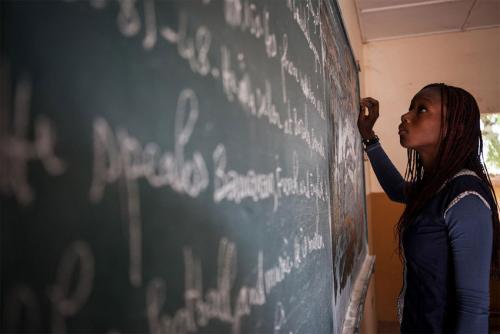Millions of children denied education due to conflict – UN warns
Some 28.5 million children in countries affected by conflict are being denied access to learning, with tens of thousands of schools attacked or occupied by armed forces, heightening the risk they will never go to school or will drop out, the United Nations and its partners warned calling for urgent action.

A student writes on a chalkboard at a school in Bamako, Mali.
“We’re here because education should never be a casualty of crisis…or a cost of conflict,” UN Children’s Fund (UNICEF) Executive Director Anthony Lake told the Education Cannot Wait event, held on the margins of the UN General Assembly’s annual general debate.
“Education cannot wait for battles to end…or disasters to be averted… or funding to be available. Education cannot wait…because children cannot wait.”
More than half of the world’s 57 million primary-school-age children who are out of school live in countries scarred by war and conflict and are denied the right to an education, compared to 42 per cent in 2008. According to non-governmental organization (NGO) Save the Children, conflicts, fighting and displacement in countries such as Syria, the Central African Republic, Mali, and in the Democratic Republic of Congo have largely contributed to this increase.
The meeting was convened to support Secretary-General Ban Ki-moon’s Global Education First Initiative, launched one year ago, and chaired by former British Prime Minister Gordon Brown, UN Special Envoy for Global Education.
"We must make an intentional and deliberate turn from past policy responses to humanitarian crises where education has typically been underfunded,” Mr. Brown said.
“With nearly one million Syrian refugee children, we have the opportunity to take immediate action and demonstrate that we can not only prioritize but deliver on the promise of education for all – education without borders - providing hope and opportunity even in the most dire circumstances."
The meeting called for more planning for emergency prevention and integration of emergency preparedness and recovery in education sector plans and national budgets; prioritizing education in emergencies by increasing humanitarian aid to education and improving the way it is delivered on the ground; and protection of children, teachers and education facilities from attacks.
Participants included UNICEF, the UN Educational, Scientific and Cultural Organization (UNESCO), the UN High Commissioner for Refugees (UNHCR) Save the Children, Global Partnership for Education, International Network for Education in Emergencies (INEE), the Global Coalition to Protect Education from Attack, and Plan International.
"Education must be built into peace building – not bolted on – and it must be tied with longer-term development,” UNESCO Director-General Irina Bokova said.
Global Partnership for Education Chief Executive Alice Albright noted that education in emergency situations is severely underfunded, accounting for merely 1.4 per cent of humanitarian aid.
“We should at least double this amount, make it more effective, and improve coordination among Governments, donors and humanitarian agencies,” she said, stressing that quality education requires investment and planning to give children living in some of the toughest parts of the world hope and a chance to shape their futures.
Source:UN News
- 362 reads
Human Rights
Ringing FOWPAL’s Peace Bell for the World:Nobel Peace Prize Laureates’ Visions and Actions

Protecting the World’s Cultural Diversity for a Sustainable Future

The Peace Bell Resonates at the 27th Eurasian Economic Summit

Declaration of World Day of the Power of Hope Endorsed by People in 158 Nations

Puppet Show I International Friendship Day 2020

